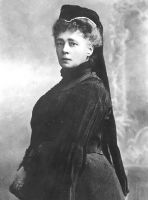Bertha von Suttner
„No sensible person would ever consider removing an ink stain with ink, an oil stain with oil. However, blood over and again should be washed away with blood.”
Bertha, daughter of Count Franz Josef Kinsky von Wchinitz und Tettau, an army general, and his wife Sophia Wilhelmine, grew up in aristocratic circles shaped by the Austrian Hungarian Empire and its military background.
Already in her early years she was a devoted reader, and her cousin Elvira, having an even bigger literary knowledge, challenged her to start some writing.
Together with her mother she toured Europe. However, when the inheritance due to her mother’s gambling addiction was depleted, Bertha was designated to start a career as a singer or to marry a rich man. Both failed.
Therefore Bertha (then still Countess Kinsky) took on the position as governess in the family of Baron von Suttner in Vienna in 1873. There she also got acquainted with the youngest son Arthur Gundaccar von Suttner, and they fell in love. For this reason she was dismissed and in 1876 started working as secretary and matron for Alfred Nobel. But already one week later he was summoned back to Sweden. Nevertheless they stayed in lifelong contact and she inspired the initiation of the Peace Nobel Price.
Bertha hurries back to Vienna and secretly marries Baron Arthur Gundaccar von Suttner, who as a consequence was disinherited. The couple emigrated to the Caucasus region and stayed there for nine years, often under very precarious financial circumstances. Both started to write for publications, initially about the Russian-Turkish war, then descriptions of the countryside and life in their adopted home, as well as short stories and essays for various journals. In 1855 they return to Austria to live in manor Harmannsdorf, the family property of her parents in law, with whom they were meanwhile reconciled.
From this time on both attend conventions of authors’ associations, e.g. in Berlin, and Bertha intensified her engagement for pacifism.
1886/87 stay in Paris and a reunion with Alfred Nobel.
1887 she starts writing her book “Die Waffen nieder!” (Lay Down Your Arms). Bertha describes therein the terror of war from the perspective of a wife, which was close to the pulse of time, as heated debates about militarism and war were going on. She postulated that peace was the normal condition according to nature, war a consequence of human folly.
In 1889 “Die Waffen nieder!” was published (till 1907 in 37 editions and in 12 languages). Besides a large number of supporters she also had many antagonists and was ridiculed – “Peace Bertha”.
In 1891 Bertha established the “Austrian Association Friends of Peace” and stayed its president until her death. In the same year the World Peace Conference took place in Rome.
She also engaged in activities against animal experiments and as a fervent admirer of Darwin’s theories she was convinced that a positive evolution of mankind to become liberal, compassionate and peace loving human beings would take place.
As the only woman Bertha attends the First Haag Peace Conference in 1899 and on her own travels 1902 to the Peace Congress in Monaco. Her husband is already severely ill and dies in December of the same year. Despite many efforts manor Harmannsdorf cannot be kept because of excessive indebtedness.
In 1903 Bertha is a guest of Count Albert I. of Monaco, and the “Institut International de la Paix” is opened.
In 1905 she undertakes a lecture tour in Germany. The complete edition of her works is published in 12 volumes. The Peace Nobel Price is awarded to her and she receives it in Oslo on 18th April 1906. Alfred Nobel had expected that she would be the first Peace Nobel Price laureate, but in fact only in the fifth round she got the award. The Norwegian and Danish royal families receive her.
Since 1912 she warned insistently against the looming danger of an international war of extermination, the universal armament und the interests of the weaponry lobby. Almost 70 years of age, she sets out for her second trip to the USA (the first was 1904 to the Peace Congress in Boston). In 1913 a film version was made of her novel “Die Waffen nieder!”
During the preparations for the Peace congress in Vienna Bertha died on 21st June 1914 – just one week prior to the assassination of Crown Prince Ferdinand and his wife Sophie in Sarajevo.
Her last words: ”Lay down your arms – tell it to many – many”.
Bertha von Suttner’s life was characterized by hard work, frequent financial difficulties, long and at that time still arduous journeys and a vision of a world without wars and armed conflicts, which was then still regarded as utopian.
She had to face a lot of opposition and malice, but she never gave up and published many articles and essays, which are relevant until today. Many streets, squares and schools bear her name and her picture is on banknotes and coins.
„Maybe in times to come people will know little or only as much as literary giants will permit about this novel („Die Waffen nieder!“). However, its title already today is heading the first page of a new world history.” (Obituary by Marie Eugenie Delle Grazie)
Translation: Ulrike Rahmatian
Sources i.a.:
Dieter Wunderlich: ”WageMutige Frauen”
http://www.nobelprize.org/nobel_prizes/peace/laureates/1905/suttner-bio.html
Photocredits: Bertha von Suttner, Photograph 1906 by Pietzner, Carl.
Source: Picture Archive ONB PF 3437 C5 with friendly permission ONB (Austrian National Liberty) of 20.01. 2014
http://www.bildarchivaustria.at/Pages/ImageDetail.aspx?p_iBildID=1555358




